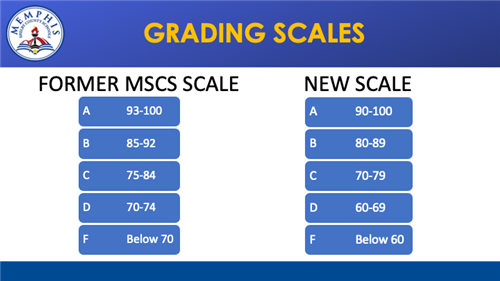Students give new grading scale an A+

Due to the revisions to Policy 5014 and Policy 5015, Memphis Shelby County Schools has switched to a 10-point grading scale. This adjustment gives students a buffer for getting an A and 10 more points before they fail.
Some knew it as the scourge of the earth, others as the final straw; the horror that haunts every overachiever’s dreams: the infamous 90 — a B. However, with the turn of the 2022-2023 school year, this nightmare finally ended as Memphis Shelby County Schools changed to a 10-point grading scale, giving students a three point margin of error for their A’s and 10 more points before they fail.
“It changed to a 10-point grading scale, which I think is pretty good,” Luke Parker (12) said. “It’s just going to help everyone’s GPA because it makes it harder to get an F and easier to get an A.”
One major factor of relief for students is the three point difference in this grading scale that gives students more opportunities to achieve an A: a frustrating 92 B on a test now becomes an A. For students feeling pressured to maintain straight As, some of that stress is relieved as the gap between an A and a B is widened.
“[The grading scale change] might help prevent stress a little bit,” Sadie Davis (9) said. “Let’s say you have 15 homework assignments and a bunch of things going on … now it’s okay for you to mess up on a couple assignments because you’ll still get an A or a B or just a really good grade even if you slack up a little bit.”
Another aspect students find desirable would be the now ten point difference in a failing grade; however, equal concerns are raised as to whether these students should be allowed to pass — if knowing only 60 percent of the material is enough to warrant a passing grade.
“It makes it more easy to pass even if you don’t have comprehension of what you need to move on to the next level, so that’s a little concerning,” Pre-Calculus teacher Kristina Wong said. “Next year, [in] a higher level class they’re going to get bogged down [and] the teacher can’t teach at the level that the teacher is supposed to teach at because their students aren’t at that level, so it’s a chain reaction of bad effects.”
On the other hand, some believe that this extended buffer before failing may encourage students to try harder as a 60 average may be more achievable for a student than a 70 average. Students who have failed classes before may now have a greater incentive to try with the positive reinforcement of a passing grade.
“I think it honestly depends because [the policy change is] going to be really helpful for some people because it’s like that extra reinforcement of like ‘you’re trying hard’ — you might not be still getting there, but you’re trying hard, and you’re still passing which is definitely going to be very helpful for a lot of students,” Davis said.
One tragedy for upperclassmen especially is the timing of this policy’s introduction into their high school careers. As the policy would have affected the upperclassmen of any year it was introduced in this way, many seniors instead choose to enjoy the benefits of the new grading scale in their final years of high school rather than lament when the policy changed.
“I wouldn’t say it’s unfair [for upperclassmen] because at least it happened,” Parker said. “I wish it happened a little earlier because it would have been nice to have … past years a little easier, but I’m not too mad about it.”
Whether the valedictorian or the students just counting the days until school is out, the new grading scale brings much change into this year — a change largely welcomed by the student body. However, even though the grading scale has changed, these classes and their purpose have not: students are still here to learn and to be scored on understanding, and the teachers will continue to grade in this way.
“We’ll adjust accordingly and still just pass the kids who deserve to pass,” Wong said. “I do think too much emphasis is put on letter grades … and it’s overriding the main purpose of school which is to learn, and so it’s frustrating for kids to be so fixated on what their number is … it’s like well how much have you learned? Shouldn’t you think more about that than what your letter grade is?”
Your donation will support the student journalists of White Station High School. Your contribution will allow us to purchase equipment and cover our annual website hosting costs.

































